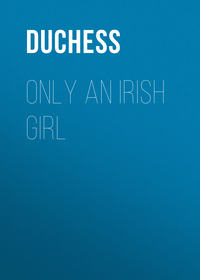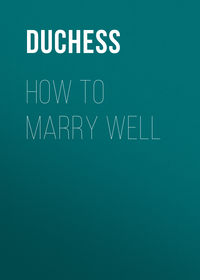 полная версия
полная версияMrs. Geoffrey
It was in the boudoir they were sitting, and Violet was dressed in some soft gray dress that shone and turned into palest pearl as she moved. It was his mother's boudoir, the room she most affects, with its crimson and gray coloring and its artistic arrangements, that blend so harmoniously, and are so tremendously becoming to the complexion when the blinds are lowered. How pretty Mona would look in a gray and crimson room? how —
"What are you thinking of?" asks Mona, softly, breaking in upon his soliloquy.
"Of the last time I heard any one sing," returns he, slowly. "I was comparing that singer very unfavorably with you. Your voice is so unlike what one usually hears in drawing-rooms."
He means highest praise. She accepts his words as a kind rebuke.
"Is that a compliment?" she says, wistfully. "Is it well to be unlike all the world? Yet what you say is true, no doubt. I suppose I am different from – from all the other people you know."
This is half a question; and Geoffrey, answering it from his heart, sinks even deeper into the mire.
"You are indeed," he says, in a tone so grateful that it ought to have betrayed to her his meaning. But grief and disappointment have seized upon her.
"Yes, of course," she says, dejectedly. A cloud seems to have fallen upon her happy hour. "When did you hear that – that last singer?" she asks, in a subdued voice.
"At home," returns he. He is gazing out of the window, with his hands clasped behind his back, and does not pay so much attention to her words as is his wont.
"Is your home very beautiful?" asks she, timidly, looking at him the more earnestly in that he seems rapt in contemplation of the valley that spreads itself before him.
"Yes, very beautiful," he answers, thinking of the stately oaks and aged elms and branching beeches that go so far to make up the glory of the ivied Towers.
"How paltry this country must appear in comparison with your own!" goes on the girl, longing for a contradiction, and staring at her little brown hands, the fingers of which are twining and intertwining nervously with one another, "How glad you will be to get back to your own home!"
"Yes, very glad," returns he, hardly knowing what he says. He has gone back again to his first thoughts, – his mother's boudoir, with its old china, and its choice water-colors that line the walls, and its delicate Italian statuettes. In his own home – which is situated about fourteen miles from the Towers, and which is rather out of repair through years of disuse – there are many rooms. He is busy now trying to remember them, and to decide which of them would look best decked out in crimson and gray, or blue and silver: he hardly knows which would suit her best. Perhaps, after all —
"How strange it is!" says Mona's voice, that has now a faint shade of sadness in it. "How people come and go in one's lives, like the waves of the restless sea, now breaking at one's feet, now receding, now – "
"Only to return," interrupts he, quickly. "And – to break at your feet? to break one's heart, do you mean? I do not like your simile."
"You jest," says Mona, full of calm reproach. "I mean how strangely people fall into one's lives and then out again!" She hesitates. Perhaps something in his face warns her, perhaps it is the weariness of her own voice that frightens her, but at this moment her whole expression changes, and a laugh, forced but apparently full of gayety, comes from her lips. It is very well done indeed, yet to any one but a jealous lover her eyes would betray her. The usual softness is gone from them, and only a well-suppressed grief and a pride that cannot be suppressed take its place.
"Why should they fall out again?" says Rodney, a little angrily, hearing only her careless laugh, and – man-like – ignoring stupidly the pain in her lovely eyes. "Unless people choose to forget."
"One may choose to forget, but one may not be able to accomplish it. To forget or to remember is not in one's own power."
"That is what fickle people say. But what one feels one remembers."
"That is true, for a time, with some. Forever with others."
"Are you one of the others?"
She makes him no answer.
"Are you?" she says, at length, after a long silence.
"I think so, Mona. There is one thing I shall never get."
"Many things, I dare say," she says, nervously, turning from him.
"Why do you speak of people dropping out of your life?"
"Because, of course, you will, you must. Your world is not mine."
"You could make it yours."
"I do not understand," she says, very proudly, throwing up her head with a charming gesture. "And, talking of forgetfulness, do you know what hour it is?"
"You evidently want to get rid of me," says Rodney, discouraged, taking up his hat. He takes up her hand, too, and holds it warmly, and looks long and earnestly into her face.
"By the by," he says, once more restored to something like hope, as he notes her drooping lids and changing color and how she hides from his searching gaze her dark, blue, Irish eyes, that, as somebody has so cleverly expressed it, seem "rubbed into her head with a dirty finger," so marked lie the shadows beneath them, that enhance and heighten their beauty, – "by the by, you told me you had a miniature of your mother in your desk, and you promised to show it to me." He merely says this with a view to gaining more time, and not from any overwhelming desire to see the late Mrs. Scully.
"It is here," says Mona, rather pleased at his remembering this promise of hers, and, going to a desk, proceeds to open a secret drawer, in which lies the picture in question.
It is a very handsome picture, and Geoffrey duly admires it; then it is returned to its place, and Mona, opening the drawer next to it, shows him some exquisite ferns dried and gummed on paper.
"What a clever child you are!" says Geoffrey, with genuine admiration. "And what is here?" laying his hand on the third drawer.
"Oh, do not open that – do not!" says Mona, hastily, in an agony of fear, to judge by her eyes, laying a deterring hand upon his arm.
"And why not this or any other drawer?" says Rodney, growing pale. Again jealousy, which is a demon, rises in his breast, and thrusts out all gentler feelings. Her allusion to Mr. Moore, most innocently spoken, and, later on, her reference to the students, have served to heighten within him angry suspicion.
"Do not!" says Mona, again, as though fresh words are impossible to her, drawing her breath quickly. Her evident agitation incenses him to the last degree. Opening the drawer impulsively, he gazes at its contents.
Only a little withered bunch of heather, tied by a blade of grass! Nothing more!
Rodney's heart throbs with passionate relief, yet shame covers him; for he himself, one day, had given her that heather, tied, as he remembers, with that selfsame grass; and she, poor child, had kept it ever since. She had treasured it, and laid it aside, apart from all other objects, among her most sacred possessions, as a thing beloved and full of tender memories; and his had been the hand to ruthlessly lay bare this hidden secret of her soul.
He is overcome with contrition, and would perhaps have said something betraying his scorn of himself, but she prevents him.
"Yes," she says, with cheeks colored to a rich carmine, and flashing eyes, and lips that quiver in spite of all her efforts at control, "that is the bit of heather you gave me, and that is the grass that tied it. I kept it because it reminded me of a day when I was happy. Now," bitterly, "I no longer care for it: for the future it can only bring back to me an hour when I was grieved and wounded."
Taking up the hapless heather, she throws it on the ground, and, in a fit of childish spleen, lays her foot upon it and tramples it out of all recognition. Yet, even as she does so, the tears gather in her eyes, and, resting there unshed, transfigure her into a lovely picture that might well be termed "Beauty in Distress." For this faded flower she grieves, as though it were, indeed, a living thing that she has lost.
"Go!" she says, in a choked voice, and with a little passionate sob, pointing to the door. "You have done mischief enough." Her gesture is at once imperious and dignified. Then in a softer voice, that tells of sorrow, and with a deep sigh, "At least," she says, "I believed in your honor!"
The reproach is terrible, and cuts him to the heart. He picks up the poor little bruised flower, and holds it tenderly in his hand.
"How can I go," he says, without daring to look at her, "until, at least, I ask for forgiveness?" He feels more nervous, more crushed in the presence of this little wounded Irish girl with her pride and her grief, than he has ever felt in the presence of an offended fashionable beauty full of airs and caprices. "Mona, love makes one cruel: I ask you to remember that, because it is my only excuse," he says, warmly. "Don't condemn me altogether; but forgive me once more."
"I am always forgiving you, it seems to me," says Mona, coldly, turning from him with a frown. "And as for that heather," facing him again, with eyes shamed but wrathful, "I just kept it because – because – oh, because I didn't like to throw it away! That was all!"
Her meaning, in spite of her, is clear; but Geoffrey doesn't dare so much as to think about it. Yet in his heart he knows that he is glad because of her words.
"You mustn't think I supposed you kept it for any other purpose," he says, quite solemnly, and in such a depressed tone that Mona almost feels sorry for him.
He has so far recovered his courage that he has taken her hand, and is now holding it in a close grasp; and Mona, though a little frown still lingers on her low, broad forehead, lets her hand so lie without a censure.
"Mona, do be friends with me," he says at last, desperately, driven to simplicity of language through his very misery. There is a humility in this speech that pleases her.
"It is really hardly worth talking about," she says, grandly. "I was foolish to lay so great a stress on such a trifling matter. It doesn't signify, not in the least. But – but," the blood mounting to her brow, "if ever you speak of it again, – if ever you even mention the word 'heather,' – I shall hate you!"
"That word shall never pass my lips again in your company, – never, I swear!" says he, "until you give me leave. My darling," in a low tone, "if you could only know how vexed I am about the whole affair, and my unpardonable conduct! Yet, Mona, I will not hide from you that this little bit of senseless heather has made me happier than I have ever been before."
Stooping, he presses his lips to her hand for the first time. The caress is long and fervent.
"Say I am quite forgiven," he pleads, earnestly, his eyes on hers.
"Yes. I forgive you," she says, almost in a whisper, with a seriousness that amounts to solemnity.
Still holding her hand, as though loath to quit it, he moves towards the door; but before reaching it she slips away from him, and says "Good-by" rather coldly.
"When am I to see you again?" says Rodney, anxiously.
"Oh not for ever so long," returns she, with much and heartless unconcern. (His spirits sink to zero.) "Certainly not until Friday," she goes on, carelessly. (As this is Wednesday, his spirits once more rise into the seventh heaven.) "Or Saturday, or Sunday, or perhaps some day next week," she says, unkindly.
"If on Friday night there is a good moon," says Rodney, boldly, "will you take me, as you promised, to see the Bay?"
"Yes, if it is fine," says Mona, after a faint hesitation.
Then she accompanies him to the door, but gravely, and not with her accustomed gayety. Standing on the door-step he looks at her, and, as though impelled to ask the question because of her extreme stillness, he says, "Of what are you thinking?"
"I am thinking that the man we saw before going into Kitty's cabin is the murderer!" she says, with a strong shudder.
"I thought so all along," says Geoffrey, gravely.
CHAPTER VI
HOW THE MYSTIC MOONBEAMS THROW THEIR RAYS ON MONA; AND HOW GEOFFREY, JEALOUS OF THEIR ADMIRATION, DESIRES TO CLAIM HER AS HIS OWN
Friday is fine, and towards nightfall grows still milder, until it seems that even in the dawn of October a summer's night may be born.
The stars are coming out one by one, – slowly, tranquilly, as though haste has got no part with them. The heavens are clothed in azure. A single star, that sits apart from all the rest, is twinkling and gleaming in its blue nest, now throwing out a pale emerald ray, now a blood-red fire, and anon a touch of opal, faint and shadowy, yet more lovely in its vagueness than all the rest, until verily it resembles "a diamond in the sky."
Geoffrey coming to the farm somewhat early in the evening, Mona takes him round to the yard, where two dogs, hitherto unseen by Geoffrey, lie chained. They are two splendid bloodhounds, that, as she approaches, rise to their feet, and, lifting their massive heads, throw out into the night-air a deep hollow bay that bespeaks welcome.
"What lovely creatures!" says Geoffrey, who has a passion for animals: they seem to acknowledge him as a friend. As Mona looses them from their den, they go to him, and, sniffing round him, at last open their great jaws into a satisfied yawn, and, raising themselves, rest their paws upon his breast and rub their faces contentedly against his.
"Now you are their friend forever," says Mona, in a pleased tone. "Once they do that, they mean to tell you they have adopted you. And they like very few people: so it is a compliment."
"I feel it keenly," says Rodney, caressing the handsome creatures as they crouch at his feet. "Where did you get them?"
"From Mr. Moore." A mischievous light comes into her face as she says this, and she laughs aloud. "But, I assure you, not as a love-token. He gave them to me when they were quite babies, and I reared them myself. Are they not lovely? I call them? 'Spice' and 'Allspice,' because one has a quicker temper than the other."
"The names are original, at all events," says Geoffrey, – "which is a great charm. One gets so tired of 'Rags and Tatters,' 'Beer and Skittles,' 'Cakes and Ale,' and so forth, where pairs are in question, whether they be dogs or ponies."
"Shall we set out now?" says Mona; and she calls "Mickey, Mickey," at the top of her strong young lungs.
The man who manages the farm generally – and is a plague and a blessing at the same time to his master – appears round a corner, and declares, respectfully, that he will be ready in a "jiffy" to accompany Miss Mona, if she will just give him time to "clane himself up a bit."
And in truth the "claning" occupies a very short period, – or else Mona and Geoffrey heed not the parting moments. For sometimes
"Time, as he passes us, has a dove's wing,Unsoiled and swift, and of a silken sound.""I'm ready now, miss, if you are," says Mickey from the background, with the utmost bonhommie, and in a tone that implies he is quite willing not to be ready, if it so pleases her, for another five minutes or so, or even, if necessary, to efface himself altogether. He is a stalwart young Hibernian, with rough hair and an honest face, and gray eyes, merry and cunning, and so many freckles that he looks like a turkey-egg.
"Oh, yes, I am quite ready," says Mona, starting somewhat guiltily. And then they pass out through the big yard-gate, with the two dogs at their heels, and their attendant squire, who brings up the rear with a soft whistle that rings through the cool night-air and tells the listening stars that the "girl he loves is his dear," and his "own, his artless Nora Creana."
Geoffrey and Mona go up the road with the serenader behind them, and, turning aside, she guiding, mount a stile, and, striking across a field, make straight for the high hill that conceals the ocean from the farm. Over many fields they travel, until at length they reach the mountain's summit and gaze down upon the beauteous scene below.
The very air is still. There is no sound, no motion, save the coming and going of their own breath as it rises quickly from their hearts, filled full of passionate admiration for the loveliness before them.
From the high hill on which they stand, steep rocks descend until they touch the water's edge, which lies sleeping beneath them, lulled into slumber by the tranquil moon as she comes forth "from the slow opening curtains of the clouds."
Far down below lies the bay, calm and placid. Not a ripple, not a sigh comes to disturb its serenity or mar the perfect beauty of the silver pathway thrown so lightly upon it by the queen of heaven. It falls there so clear, so unbroken, that almost one might deem it possible to step upon it, and so walk onwards to the sky that melts into it on the far horizon.
The whole firmament is of a soft azure, flecked here and there with snowy clouds tipped with palest gray. A little cloud – the tenderest veil of mist – hangs between earth and sky.
"The moon is up; it is the dawn of night;Stands by her side one bold, bright, steady star,Star of her heart.Mother of stars! the heavens look up to thee."Mona is looking up to it now, with a rapt, pensive gaze, her great blue eyes gleaming beneath its light. She is sitting upon the side of the hill, with her hands clasped about her knees, a thoughtful expression on her lovely face. At each side of her, sitting bolt upright on their huge haunches, are the dogs, as though bent on guarding her against all evil.
Geoffrey, although in reality deeply impressed by the grandeur of all the surroundings, yet cannot keep his eyes from Mona's face, her pretty attitude, her two mighty defenders. She reminds him in some wise of Una and the lion, though the idea is rather far-fetched; and he hardly dares speak to her, lest he shall break the spell that seems to lie upon her.
She herself destroys it presently.
"Do you like it?" she asks, gently, bringing her gaze back from the glowing heavens, to the earth, which is even more beautiful.
"The praise I heard of it, though great, was too faint," he answers her, with such extreme sincerity in his tone as touches and gladdens the heart of the little patriot at his feet. She smiles contentedly, and turns her eyes once more with lazy delight upon the sea, where each little point and rock is warmed with heavenly light. She nods softly to herself, but says nothing.
To her there is nothing strange or new, either in the hour or the place. Often does she come here in the moonlight with her faithful attendant and her two dogs, to sit and dream away a long sweet hour brimful of purest joy, whilst drinking in the plaintive charm that Nature as a rule flings over her choicest paintings.
To him, however, all is different; and the hour is fraught with a tremulous joy, and with a vague sweet longing that means love as yet untold.
"This spot always brings to my mind the thoughts of other people," says Mona, softly. "I am very fond of poetry: are you?"
"Very," returns he, surprised. He has not thought of her as one versed in lore of any kind. "What poets do you prefer?"
"I have read so few," she says, wistfully, and with hesitation. Then, shyly, "I have so few to read. I have a Longfellow, and a Shakspeare, and a Byron: that is all."
"Byron?"
"Yes. And after Shakspeare, I like him best, and then Longfellow. Why do you speak in that tone? Don't you like him?"
"I think I like no poet half so well. You mistake me," replies he, ashamed of his own surprise at her preference for his lordship beneath the calm purity of her eyes. "But – only – it seemed to me Longfellow would be more suited to you."
"Well, so I do love him. And just then it was of him I was thinking: when I looked up to the sky his words came back to me. You remember what he says about the moon rising 'over the pallid sea and the silvery mist of the meadows,' and how, —
'Silently, one by one, in the infinite meadows of heaven,Blossomed the lovely stars, the forget-me-nots of the angels,That is so sweet, I think."
"I remember it; and I remember, too, who watched all that: do you?" he asks, his eyes fixed upon hers.
"Yes; Gabriel – poor Gabriel and Evangeline," returns she, too wrapped up in recollections of that sad and touching tale to take to heart his meaning: —
'Meanwhile, apart, in the twilight gloom of a window's embrasureSat the lovers, and whispered together.'That is the part you mean, is it not? I know all that poem very nearly by heart."
He is a little disappointed by the calmness of her answer.
"Yes; it was of them I thought," he says, turning his head away, – "of the – lovers. I wonder if their evening was as lovely as ours?"
Mona makes no reply.
"Have you ever read Shelley?" asks he, presently, puzzled by the extreme serenity of her manner.
She shakes her head.
"Some of his ideas are lovely. You would like his poetry, I think."
"What does he say about the moon?" asks Mona, still with her knees in her embrace, and without lifting her eyes from the quiet waters down below.
"About the moon? Oh, many things. I was not thinking of the moon," with faint impatience; "yet, as you ask me, I can remember one thing he says about it."
"Then tell it to me," says Mona.
So at her bidding he repeats the lines slowly, and in his best manner, which is very good: —
"The cold chaste moon, the queen of heaven's bright isles,Who makes all beautiful on which she smiles!That wandering shrine of soft yet icy flame,Which ever is transformed, yet still the same,And warms, but not illumines."He finishes; but, to his amazement, and a good deal to his chagrin, on looking at Mona he finds she is wreathed in smiles, – nay, is in fact convulsed with silent laughter.
"What is amusing you?" asks he, a trifle stiffly. – To give way to recitation, and then find your listener in agonies of suppressed mirth, isn't exactly a situation one would hanker after.
"It was the last line," says Mona, in explanation, clearly ashamed of herself, yet unable wholly to subdue her merriment. "It reminded me so much of that speech about tea, that they always use at temperance meetings; they call it the beverage 'that cheers but not inebriates.' You said 'that warms but not illumines,' and it sounded exactly like it. Don't you see!"
He doesn't see.
"You aren't angry, are you?" says Mona, now really contrite. "I couldn't help it, and it was like it, you know."
"Angry? no!" he says, recovering himself, as he notices the penitence on the face upraised to his.
"And do say it is like it," says Mona, entreatingly.
"It is, the image of it," returns he, prepared to swear to anything she may propose And then he laughs too, which pleases her, as it proves he no longer bears in mind her evil deed; after which, feeling she still owes him something, she suddenly intimates to him that he may sit down on the grass close beside her. He seems to find no difficulty in swiftly following up this hint, and is soon seated as near to her as circumstances will allow.
But on this picture, the beauty of which is undeniable, Mickey (the barbarian) looks with disfavor.
"If he's goin' to squat there for the night, – an' I see ivery prospect of it," says Mickey to himself, – "what on airth's goin' to become of me?"
Now, Mickey's idea of "raal grand" scenery is the kitchen fire. Bays and rocks and moonlight, and such like comfortless stuff, would be designated by him as "all my eye an' Betty Martin." He would consider the bluest water that ever rolled a poor thing if compared to the water that boiled in the big kettle, and sadly inferior to such cold water as might contain a "dhrop of the crather." So no wonder he views with dismay Mr. Rodney's evident intention of spending another half hour or so on the top of Carrick dhuve.
Patience has its limits. Mickey's limit comes quickly When five more minutes have passed, and the two in his charge still make no sign, he coughs respectfully but very loudly behind his hand. He waits in anxious hope for the result of this telling man[oe]uvre, but not the faintest notice is taken of it. Both Mona and Geoffrey are deaf to the pathetic appeal sent straight from his bronchial tubes.
Mickey, as he grows desperate, grows bolder. He rises to speech.









